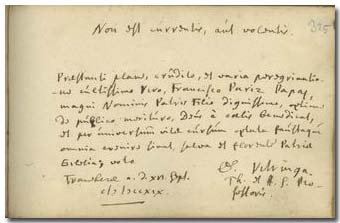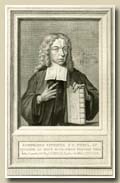
Non est currentis, aut volentis. *
Praestanti plane, erudito, et varia peregrinatione cultissimo
Viro, Francisco Pariz Papaj, magni Nominis Patris Filio
dignissimo, optime de publico merituro, Deus è coelis benedicat,
et per universum vitae cursum optata faustaque omnia evenire
sinat, salva et florente Patriae Ecclesia; voto
C[ampegius] Vitringa Th[eologiae] et H[istoriae] S[acrae]
Professoris

|
* The motto is a paraphrase of Rom 9:16: “So
then it is not of him that willeth, nor of him that runneth,
but of God that sheweth mercy”; Vulgate: “igitur non volentis neque currentis sed
miserentis Dei”.
|
|
|
Not of him that runneth, nor of him that willeth. *
I wish to the eminent, erudite and in the many
peregrinations experienced Ferenc Pápai Páriz, worthy son of his
renowned father, who deserves all the best: that God might bless
him from heaven, and might all his efforts reach fortunate
success, in the middle of the integrity and flourishing of the
church of his fatherland,
Campegius Vitringa
professor of theology and church history
In Franeker, on September 16, 1719.
|
p. 325. Franeker, September 16, 1719
 Vitringa, Campegius,
Sen. Vitringa, Campegius,
Sen.
(1659-1722), Dutch Reformed
theologian, orientalist
Campegius Vitringa, Sen. (Kempe Vitringa) was born
on May (March?) 16, 1659 in Leeuwarden, the son of the clerk of
the Supreme Council of Frisia Horatius Wigeri Vitringa (1631-1669),
and of Albertina de Haen. He mastered Greek and Hebrew at an early
age, thus he read the Holy Script in the original languages. At
the age of 16 he studied philosophy and theology in Franeker; the
title of his three disputes is De origine monachatus. In
1678 he went to Leiden, where in the following year he graduated
doctor of theology. The chairman of one of his defences was
Friedrich Spanheim (1632-1701). In 1681 he became professor of
oriental languages, in 1633 of theology, and in 1693 of church
history in Franeker, and he was a school founder in all the three
branches. Five years later he was invited as a professor to
Utrecht, but he remained in Franeker. He died on March 31, 1722.
His two sons followed him in scientific carreer: Horatius Vitringa
only lived 18 years and died in 1696, while Campegius Vitringa,
Jr. (1693-1723) also became a professor in Franeker. Campegius V.,
Sen. published commentaries of the Bible, theological works and
controversies, like for example: Anakrisis Apocalypsios Joannis Apostoli.
Franeker, 1705. – Typus theologiae practicae … Franeker,
1716. – Hypotyposis historiae et chronologiae sacrae …
Accedit typus doctrinae propheticae. Franeker, 1708. – De
Synagoga vetere libri tres … Franeker, 1696. –
Disputationes cum H.A. Röell. – Verklaring van de
evangelische parabolen … Amsterdam, 1715. – Verdeding
daarvan tegen J.H. Coccejus.
His son, Campegius Vitringa, Jr. also wrote in the
album (p. 125).
•
Boeles II 288, 843 • Jöcher • Michaud • NNBW X 1122 |

